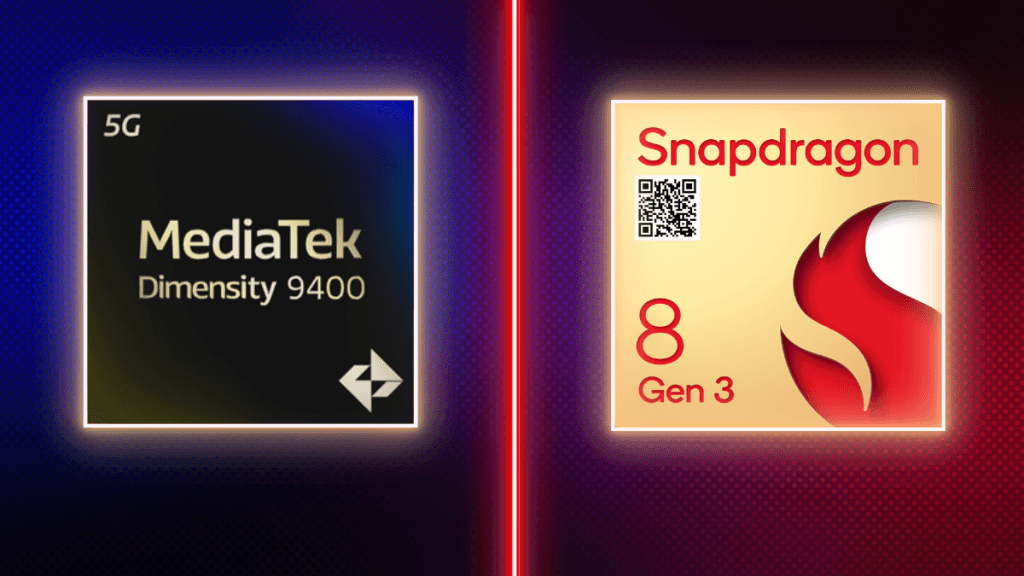MediaTek has recently unveiled its Dimensity 9400, which promises major improvements compared to its earlier model. Many of MediaTek’s assertions about the chip’s performance are accurate (check out our Dimensity 9400 vs 9300 comparison for further insights). The previous version, Dimensity 9300, did not perform as well as Snapdragon 8 Gen 3 in our benchmarking assessments. Nonetheless, the Dimensity 9400 is shaping up to be a formidable competitor.
Comparing the Chips
It will be fascinating to see how the new Dimensity 9400 measures up against the Snapdragon 8 Gen 3. In this article, we will delve into the benchmark statistics for these two chips and highlight their main distinctions.
To kick off our comparison, let’s take a look at the specifications:
| Feature | Dimensity 9400 | Snapdragon 8 Gen 3 |
|---|---|---|
| Announced | October 2024 | October 2023 |
| Model number | MT6991 | SM8650-AB, SM8650-AC |
| Process node | 3nm | 4nm |
| Manufacturer | TSMC | TSMC |
| CPU | 1 x Cortex-X925 — 3.63GHz | 1 x Cortex-X4 — 3.3GHz |
| 3 x Cortex-X4 — 3.3GHz | 3 x Cortex-A720 — 3.15GHz | |
| 4 x Cortex-A720 — 2.4GHz | 2 x Cortex-A720 — 2.96GHz | |
| 2 x Cortex-A520 — 2.27GHz | ||
| GPU | Arm Immortalis-G925 MC12 | Adreno 750 GPU |
| MediaTek Adaptive Gaming Tech 3.0 | Support for Unreal Engine 5.2 Lumen | |
| Global illumination | Snapdragon Game Super Resolution | |
| NPU | MediaTek NPU 890 | Qualcomm Hexagon NPU |
| Camera | MediaTek Imagiq 1090 ISP | Qualcomm Spectra Cognitive Triple 18-bit ISP |
| Up to 320MP single camera | Up to 200MP single camera | |
| Up to 8K/60fps video recording | 8K/30fps or 4K/120fps video recording | |
| Memory | LPDDR5X at 10667Mbps | LPDDR5x at 4.8GHz |
| Storage | UFS 4.0 + MCQ | UFS 4.0 |
| Connectivity | Downlink: 7.3Gbps | Downlink: 7Gbps |
| Wi-Fi 7 | Wi-Fi 7 | |
| Bluetooth 5.4 standard | Bluetooth 5.4 standard |
Benchmark Results
[Note: We tested Vivo X200 Pro with Dimensity 9400 and Red Magic 9S Pro with Snapdragon 8 Gen 3 for these benchmark results.]
Geekbench Comparison
Geekbench is well-known for assessing CPU performance on devices. In this regard, the Dimensity 9400 has outperformed the Snapdragon 8 Gen 3, achieving over 20% higher scores in both single-core and multi-core tests.
| Dimensity 9400 | SD 8 Gen 3 | |
|---|---|---|
| Single core | 2,751 | 2,273 |
| Multi core | 8,712 | 7,054 |
AnTuTu Comparison
AnTuTu is a widely recognized benchmarking tool for evaluating a device’s overall performance. The Dimensity 9400 excels here too, boasting over 35% higher AnTuTu scores compared to the Snapdragon 8 Gen 3.
Here’s a breakdown of the AnTuTu scores:
| Dimensity 9400 | SD 8 Gen 3 | |
|---|---|---|
| AnTuTu score | 2,927,565 | 2,165,760 |
| CPU | 634,512 | 470,836 |
| GPU | 1,287,272 | 946,221 |
| Memory | 507,889 | 392,652 |
| UX | 497,892 | 356,051 |
The MediaTek Dimensity 9400 is significantly ahead in these benchmarks against the Snapdragon 8 Gen 3. But how did MediaTek achieve such a remarkable advancement? Let’s explore the core differences below.
Core Differences
Both Dimensity 9400 and Snapdragon 8 Gen 3 are produced by TSMC, but their manufacturing nodes differ. The Dimensity 9400 is built on a 3nm process, which provides enhanced performance and energy efficiency compared to the Snapdragon’s 4nm node.
The Dimensity 9400 utilizes an all-big-core configuration, lacking small cores for efficiency. Conversely, the Snapdragon 8 Gen 3 includes two efficiency cores. The Dimensity features one Cortex-X925 core with a peak frequency of 3.63GHz, three Cortex-X4 cores at 3.3GHz, and four Cortex-A720 cores clocked at 2.4GHz.
In contrast, the Snapdragon 8 Gen 3 has a single Cortex-X4 prime core at the same clock speed, alongside five Cortex-A720 performance cores (two at 3.15GHz and two at 2.96GHz), plus two Cortex-A520 efficiency cores at 2.27GHz. Because of its larger Cortex-X925 core and all-big-core design, the Dimensity 9400 offers substantially better performance than its rival.
Even though the Dimensity 9400 is primarily designed for high performance, one might expect increased battery usage, but that’s not actually the case. In tests with Genshin Impact, the Vivo X200 Pro with Dimensity 9400 showed less power consumption than the Xiaomi 14 Ultra, which is powered by Snapdragon 8 Gen 3.
The Dimensity chip incorporates the new Imagiq 1090 ISP, enabling HDR video capture across the entire zoom range, a first for any flagship chip. It also features AI-driven camera enhancements like Gen-AI Super Resolution and Gen-AI Super Zoom, improving output quality. The latter can achieve up to 100x magnification in photos, retaining clear details.
MediaTek has also boosted the maximum camera resolution to 320MP (compared to 200MP on Snapdragon 8 Gen 3). It now supports 8K video recording at 60fps natively, while the Snapdragon variant is limited to 8K/30fps recording. Regarding connectivity, the Dimensity chip provides a higher peak download speed, though other connectivity features are quite similar.
Conclusion
MediaTek has excelled with the Dimensity 9400. In fact, it stands out as the finest Dimensity chip upgrade in recent years and surpasses the Snapdragon 8 Gen 3 in nearly every aspect. However, this doesn’t suddenly render the Snapdragon 8 Gen 3 an inferior option.
The Snapdragon 8 Gen 3 remains one of the top smartphone chips available. Regardless of whether you choose Dimensity 9400 or Snapdragon 8 Gen 3, you’ll enjoy an excellent mobile gaming experience. Both chips come equipped with gaming-centric features designed to enhance the user experience, with the MediaTek chip demonstrating better power efficiency.
If I had to choose one of these options, I would lean towards the Dimensity 9400. However, a great deal on Snapdragon 8 Gen 3 devices would be tough to resist.




Leave a Reply